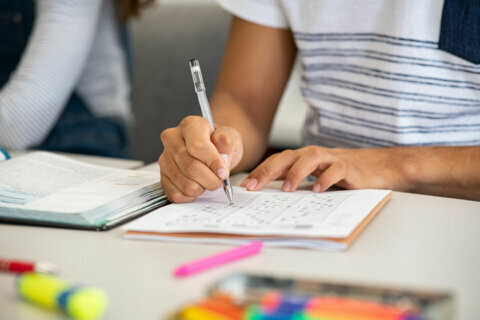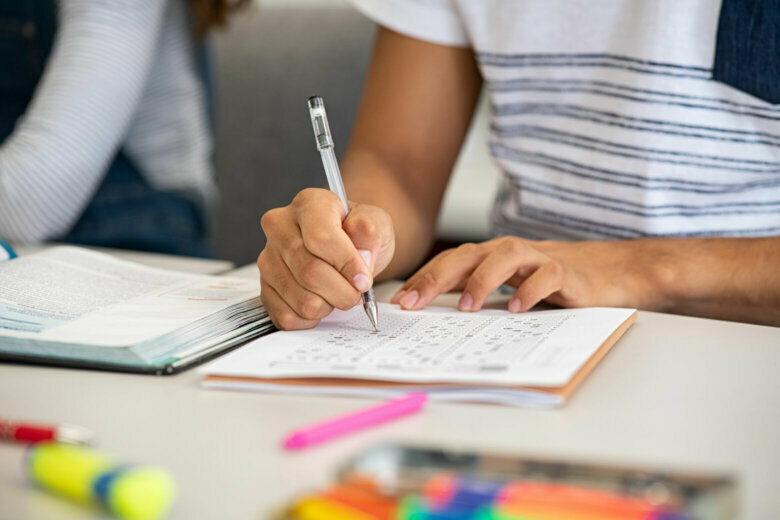
Parents and school advocates in two Maryland counties are weighing in on plans to return students back to classrooms after months of virtual learning.
Schools in Prince George’s County, Maryland, won’t reopen before Feb. 1. And upcoming board meetings on Nov. 6 and Nov. 10 in Montgomery County are set to consider how to resume in-person learning.
On Thursday, Prince George’s County officials cited data that revealed COVID-19 cases were at 13.4 per 100,000, and that the positivity rate had gone up from 3.5% to 4.3% for the week of Oct. 18-24. The hospitalization rate has dropped by 12%.
In Montgomery County, health officials said Wednesday that they remained concerned by the data that showed the case rate at 11.9 per 100,000, the highest since June. The county’s positivity rate is at 3.1%, up from 2.4% earlier in October. The number of hospital beds occupied by COVID-19 patients stood at 6.5%, considered a “moderate rate of utilization.”
Feelings about the continued distance learning among parents and student advocates in both counties range from those who have pulled children out of schools in frustration, to those who say they just need alternatives — especially for children who need special education services.
During Montgomery County’s school board virtual meeting Tuesday, comments from parents included those from Renee Zapadka, who said she had withdrawn her kindergartner from the school system, but that her sixth-grader was still enrolled — but that could change.
“Virtual learning is miserable,” Zapadka said. “These poor kids are becoming increasingly disengaged with the learning process.”
Zapadka said the virtual learning model is taking a real toll on the mental health of children, especially the youngest learners.
“Children are just crying because they’re so frustrated with virtual learning — you don’t see it — we see it,” she said.
On Wednesday night, a group of parents whose children are enrolled in special education programs in Montgomery County schools protested outside the school board headquarters, pushing for in-person education for their children.
In Prince George’s County, officials have repeated that the plan is to remain in the virtual learning model until February. On Thursday, school system CEO Monica Goldson issued a statement, saying, “There are many complexities involved in reopening school buildings safely and responsibly for in-person instruction.”
Ronetta Stanley is the founder and executive director of Loud Voices Together Educational Advocacy Group. The nonprofit works to help families of children who need special education services.
Stanley said of the virtual learning model: “It has really taken a toll — not only students, but parents and caregivers.”
Stanley said she agrees that given the COVID-19 rates in Prince George’s County, it’s not yet safe to reopen schools. But she’s clear that the virtual model isn’t sufficient for students with individual education plans, or IEPs, and 504 plans that require students be given learning accommodations.
Stanley added that she appreciates the position that Prince George’s County school officials face. Keeping schools closed to in-person learning, she said, “is not an easy decision.”
But parents want an “individualized look” at what students with IEPs need, she said.
“For those particular students, there has to be an alternative,” Stanley said.
“Some parents are securing private therapy services like PT, OT and speech,” Stanley said, but at their own expense. For families without those resources, “The child just goes without and they just languish.”
Stanley said she’s hopeful that some modifications can be made for students in Prince George’s County schools.
Given the high rate of the coronavirus in the county, she said, “To put students and staff at risk by bringing them all together — I don’t think that’s the answer. But certainly the distance learning model, one-size-fits-all, is not the answer either.”
Stanley is hopeful there can be a “healthy and safe” solution “to ensure that everyone is receiving an equitable education.”
- Sign up for WTOP alerts
- Latest coronavirus test results in DC, Maryland and Virginia
- Coronavirus FAQ: What you need to know
- Coronavirus resources: Get and give help in DC, Maryland and Virginia
- Prince George’s County officials urge vigilance as COVID-19 cases rise
- Loudoun Co. school board votes to eliminate class rank, starting with Class of 2025
- DC metro unemployment falls but nearly a quarter million still unemployed
Looking for more information? D.C., Maryland and Virginia are each releasing more data every day. Visit their official sites here: Virginia | Maryland | D.C.









